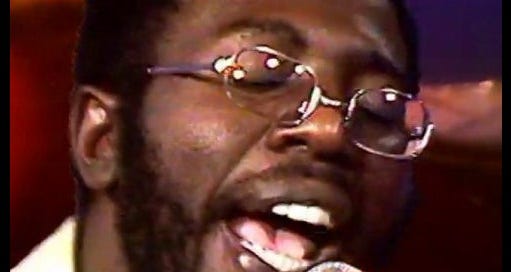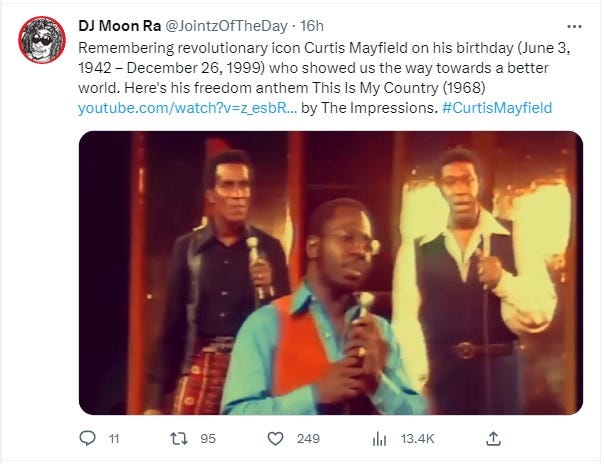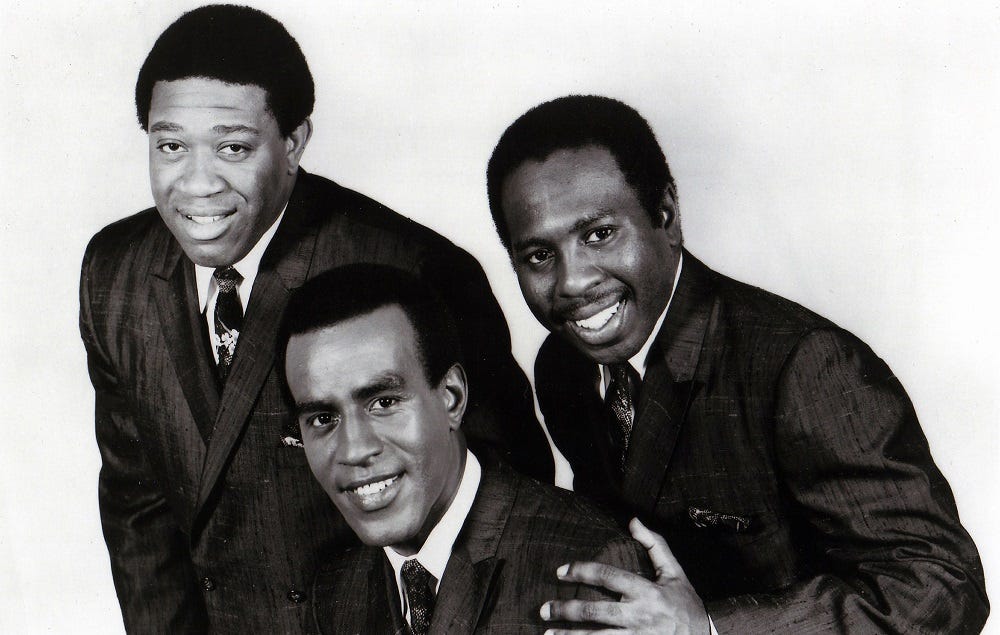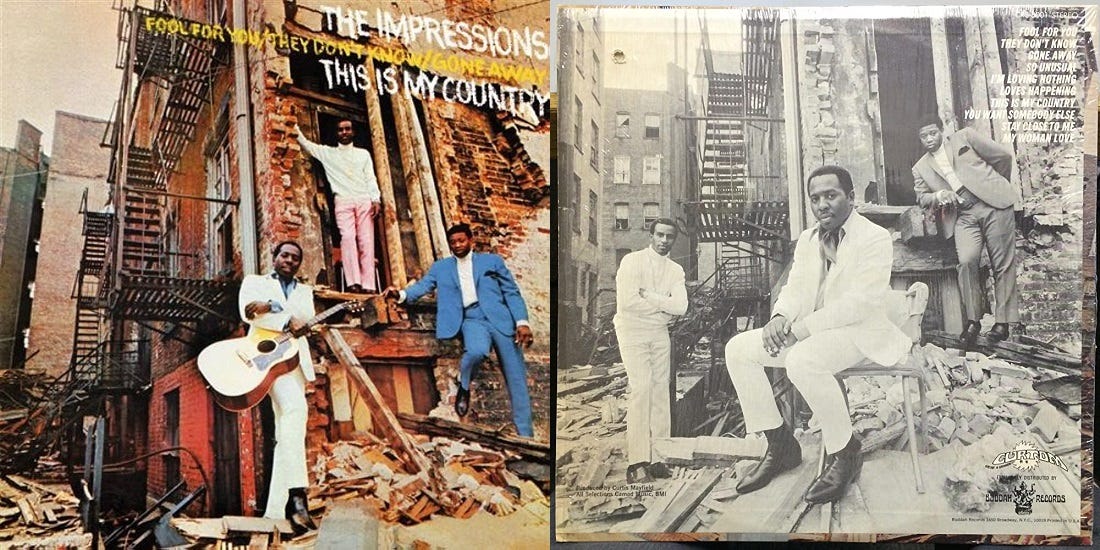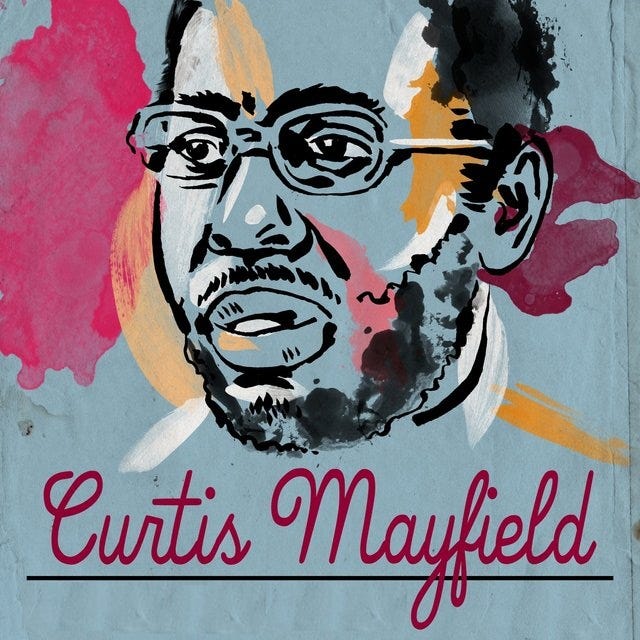Curtis Mayfield (June 3, 1942 – December 26, 1999) – This Is My Country (1968)
One of the Impressions' most powerful freedom anthems, written by the musical prophet whose songs became the soundtrack to the Civil Rights Movement.
Watch full video on Twitter.
View most updated version of this post on Substack.
Curtis Mayfield was a gifted singer/songwriter and guitarist, musical prophet, and revolutionary icon who helped write the soundtrack to the Civil Rights Movement. His songs ushered in the golden age of 1960s and 70s socially conscious soul music.
Born in Chicago, Curtis Lee Mayfield was raised by his mother and grandmother after his father left when he was five years old. He and his seven brothers and sisters spent their early years in several public housing projects and his family eventually moved into the Cabrini-Green Homes on the city’s North Side. His mother taught him to play piano at a young age, and when he was seven he sang in public for the first time at his grandmother’s Travelling Soul Spiritualists’ Church with a group called the Northern Jubilee Gospel Singers.
At age seven or eight, he discovered a guitar in the closet of their apartment and took to it immediately. As recalled by singer Jerry Butler, who became teenage friends with Mayfield:
“He used to love playing boogie woogie on the piano and he learned to play that in F sharp which meant he was playing all the black keys. That’s how he came about his unique sound on the guitar because he tuned it that way.”
Mayfield would tune his guitar using this unique, open F sharp tuning for the rest of his life, part of why his sound was so recognizable.
In 1956, at age 14, Mayfield met 17 year-old Butler. Two years later, despite his family’s objections, he dropped out of high school to join Butler in The Roosters, a doo-wop vocal group founded by brothers Arthur and Richard Brooks and Sam Gooden, three friends who had moved to Chicago from Chattanooga, Tennessee.
They changed their name to The Impressions in 1958 and recorded their first single, the ballad “For Your Precious Love.” Jerry Butler was on lead vocals, with Mayfield singing background. Co-written by Butler and the two Brooks brothers, it became a #3 R&B hit, crossing over to #11 on the Billboard Top 100. In one two-week period alone, the single sold 150,000 copies.
After their follow up single “Come Back My Love” only reached #29 R&B, Jerry Butler left the group and launched his solo career. Mayfield went with him at first as his guitarist, then returned to the Impressions and became the group’s new lead singer and songwriter. Fred Cash, who had also been an original Roosters member before leaving the group, was invited to return and replace Butler.
In 1961, they had their first Mayfield-penned hit, the enchanting “Gypsy Woman.” It went to #2 R&B and #20 on the pop charts. But their next few singles were not as successful, and Richard and Arthur Brooks left the group in 1962, leaving them to carry on as the trio of Mayfield, Gooden, and Cash.
Joining forces with producer Johnny Pate, the Impressions struck gold with “It’s Alright” in 1963, their first #1 R&B record and a #4 hit on the Hot 100. The following year, Mayfield wrote the first of his socially conscious anthems, “Keep On Pushing” (1964) which also went to #1 R&B, became the title track to their third album, and was nominated for that year’s Grammy for Best R&B Performance.
In 1965, he wrote the group’s best-known song, “People Get Ready,” which peaked at #3 R&B / #14 pop and became a Civil Rights Movement anthem. The album by the same name went to #1 on the R&B album charts. Three years later the group again hit #1 R&B with the upbeat jam “We’re A Winner.” Released in late 1967, it topped the R&B charts during the week of March 1, 1968. The song came to symbolize the Black Power era, along with James Brown’s “Say It Loud – I’m Black and I’m Proud,” which came out that August.
The Impressions released This Is My Country in November, 1968, their first album on Mayfield’s new Chicago-based Curtom record label. He co-founded the label in partnership with Eddie Thomas, the Impressions’ manager. “Curtom” was a combination of their two names. It was one of the first labels owned by a Black recording artist.
The album featured two songs co-written by Donny Hathaway, one of which, “Gone Away,“ was co-written by Mayfield, Hathaway, and Leroy Hutson. Its title track was one of the most lyrically powerful songs Mayfield would write during his long and prolific songwriting career. “This Is My Country” remains all too relevant today as white supremacists and their right-wing political allies attempt to ban the teaching of Black history, aka U.S. history, to prevent young people from learning about how slavery, segregation, and racism have shaped our nation.
“Some people think we don’t have the right to say this is my country…before they give in, they’d rather fuss and fight…then say it’s my country. I’ve paid three hundred years or more…of slave driving sweat and welts on my back. This is my country.”
Released as the album’s second single, it went to #8 R&B and #25 on the Hot 100. The album itself peaked at #5 R&B but only reached #107 on the Billboard 200.
In 1972, Mayfield met a young woman named Ethel Patricia Demps from Florida who had moved to New York City and landed the role of Lutiebelle in the 1971-72 national touring production of the hit musical Purlie (played by Melba Moore during its original Broadway run). He wrote and produced a pair of singles for her, billed as Patti Jo.
The first was the superb “Ain’t No Love Lost” b/w “Stay Away From Me,“ released in 1973 on Scepter Records. The second was the phenomenal jam “Make Me Believe In You” (1973) which came out on Wand, a Scepter subsidiary. Mayfield’s original production was fantastic. He recorded his own version of the track for his 1974 LP Sweet Exorcist. Legendary remixer Tom Moulton made Patti Jo’s original even better with his extended remix, featured on Scepter’s Disco Gold compilation in 1975.
“Make Me Believe In You” was a standard at 12 West, one of Manhattan’s most influential gay discos of the mid-seventies. The track was referenced repeatedly by Andrew Holleran in his classic 1978 novel Dancer from the Dance about queer life in New York City and Fire Island, set amidst a backdrop of the era's gay bars, nightclubs, and house parties.
Further info:
“Curtis Mayfield: Full Biography,” CurtisMayfield.com
“Gangster Boogie: Curtis Mayfield Injected His Own Commentary Into The Super Fly Legacy,” by Michael A. Gonzales, Wax Poetics, Issue #38, 2009.
“‘Traveling Soul: The Life of Curtis Mayfield,’ co-written by son Todd, delves into singer’s celebrated life and devastating, paralyzing accident,” excerpt from the book by Todd Mayfield and Travis Atria, Rolling Stone, October 3, 2016.
#soul #Impressions #CurtisMayfield


